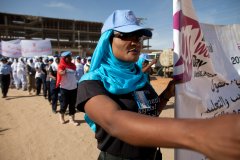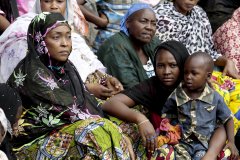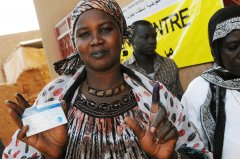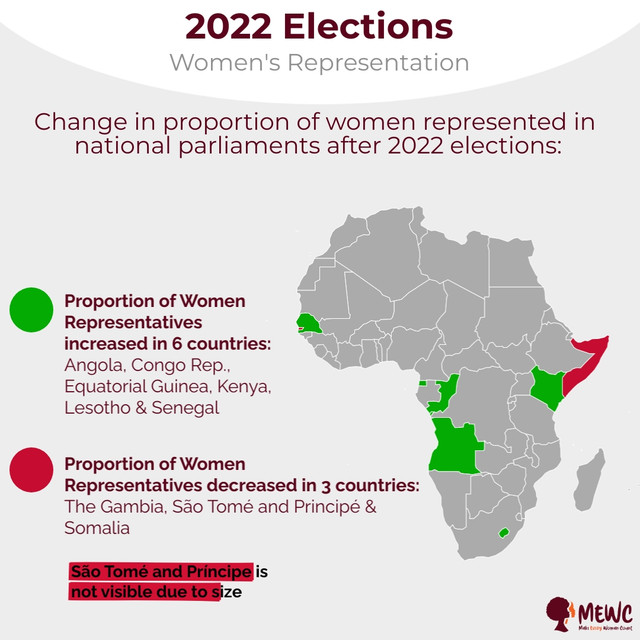Gender Issues Showlist
Women, Peace & Security
UNSCR 1325 calls on all parties to: protect and respect the rights of women and girls in conflict & post-conflict; increase women participation in all conflict resolution, peacekeeping and peace-building & to end impunity by prosecuting perpetrators of sexual and other violence on women and girls
index.php?option=com_content&view=category&id=56&Itemid=1913
Human Rights of Women
Thirty six years after the adoption of CEDAW, many women and girls still do not have equal opportunities to realize rights recognized by law. Women are denied the right to own property or inherit land. They face social exclusion, “honor killings”, FGM, trafficking, restricted mobility, early marriage,...
index.php?option=com_content&view=category&id=44&Itemid=1908
Violence Against Women
Violence against women is the most shameful human rights violation. Gender based violence not only violates human rights, but also hampers productivity, reduces human capital and undermines economic growth. It is estimated that up to 70 per cent of women experience violence in their lifetime
index.php?option=com_content&view=category&id=69&Itemid=1912
Political Participation & Leadership
Where women are fully represented, societies are more peaceful and stable. Women political participation is fundamental for gender equality and their representation in positions of leadership must be a priority for all Africans governments.
index.php?option=com_content&view=category&id=65&Itemid=1911
Latest News
- COTE D'IVOIRE: South-South Meeting to Promote Gender Equality and Combat Deforestation
- RWANDA: Rwanda Set to Launch Cervical Cancer Elimination Plan
- NIGERIA: Over 5,000 Nigerian Women Stranded in Iraq - Govt
- SUDAN: Healthcare Collapse Threatens Pregnant Women in Sudan's Sharg El Nil
- GHANA: President Nominates 12 More Ministers
- Senegal: Parliamentary election 2024
- Mauritius: Parliamentary election 2024
- Ghana: Presidential and Parliamentary Elections
- Botswana: Parliamentary elections 2024
- Algeria: Presidential Election 2024
Acting on the Call (AOTC) 2017 Summit Kicks Off in Addis Ababa: “Let’s Make the World a Better Place for Mothers and Children”
Addis Ababa, 24th August, 2017: The 4th Acting On The Call (AOTC) conference started on the 24th August 2017 at the African Union, Addis Ababa Ethiopia with a theme “Overcoming Critical Barriers to Maternal and Child Survival”. The AOTC conference which is hosted by the governments of Ethiopia and India gathered more than 500 participants from 24 countries and held in the presence of the President of the Federal Republic of Ethiopia, Ministers and high level policymakers from the public and private sectors, NGOs and UN agencies including UN Women, UNICEF, UNFPA and WHO.
The 2017 AOTC conference aims to highlight successful approaches to increasing the use of high-impact reproductive, maternal, newborn, child and adolescent health interventions (RMNCAH) with equity, quality and sustainability; to increase commitment from countries, private sector and NGOs to strengthen health systems and demonstrate global commitment and continued momentum towards ending preventable deaths and improving child and maternal health
H.E. Dr Mulatu Teshome, President of the Federal Democratic Republic of Ethiopia who officially opened the summit said “Beyond celebrating the progress to date and sharing the best practices and lessons learned, I am certain that you will also explore challenges and agree on what actions we must undertake to achieve the sustainable development goals (SDG) as well as the [SURVIVE, THRIVE and TRANSFORM] goals in the Every Woman Every Child’s Global Strategy for Women’s, Children’s and Adolescents’ Health.” Focusing on the fact that 6 million children under five, most of them infants, who die each year in Ethiopia largely due to preventable or treatable causes, he said that “more must be done to ensure that every child survives and thrives, and no mother dies from preventable causes, because of pregnancy and childbirth.” He called upon government entities, multilateral and bilateral development partners, civil society, the private sector, other stakeholders to work together to end preventable maternal and child deaths and make the world a better place .
H.E. Professor Yifru Berhan, Minister of Health of Ethiopia, noted that reducing maternal and child mortality is one of the priorities of Ethiopia and is included in the country Health Sector Transformation Plan (HSTP). Ethiopia was one of the countries that made greatest progress on reaching Millennium Development Goals 4 and 5 on child and maternal mortality, with some of this success attributed to investments in sectors other than health, including education, gender equality, and water, sanitation and hygiene.
WHO’s Director-General Dr Tedros Adhanom who as Minister of Health of Ethiopia led the launch of Acting on the call in 2012, said in a video message that “We cannot attain the ambitious targets of the SDGs unless we improve the health dignity and rights of women, children and adolescents; we must redouble our effort to root out the causes of discrimination and inequality that keeps these groups from reaching the full potential.” Dr Tedros added that “After all our global strategy is to survive, thrive and transform. We need clear ways to measure what we are doing in a transparent and accountable mechanism, determine what works and what doesn’t and learn from our mistakes while building on our successes. May the2017 AOTC summit declaration be ambitious and truly transformational vision that our future and our children depends on it.”
Dr Flavia Bustreo, Assistant Director-General for Family, Women’s and Children’s Health at WHO, speaking at the summit highlighted that “WHO shares with all of you the goals and vision of Acting on the Call - goals which are part of the Global Strategy for Women, Children and Adolescent Health. These are goals we have committed to through our respective mandates as part of Sustainable Development Goals”.
Dr Bustreo also highlighted the progress on the goals of the Global Strategy as published in a report launched last month at the high-level political forum in New York, and urged countries and all stakeholders to keep the momentum. She said “We need to achieve sustainable progress by continuing the efforts to improve equity and universal health coverage, strengthening the community health system and system resilience, as well as the emergency response where women and children are at heart of that.”
The AOTC 2017 summit will be concluded by 25 August with the release of a Ministerial declaration. A side meeting of Ministerial and delegates which was chaired by Dr Yifru Berhan, Health Minister of Ethiopia and moderated by Dr Flavia Bustreo was held on 25 August that enabled countries to share their achievement and challenges as well as inputted on the declaration to be released as an outcome of AOCT 2017.
Note to editors:
Acting on the call was launched in June 2012. The Governments of Ethiopia, India, and the United States, in collaboration with UNICEF, hosted the first summit with the goal of “Ending preventable child deaths” where more than 175 countries and over 400 civil society and faith organizations signed a pledge for child survival. Dr Tedros Adhanom, Minister of Health for Ethiopia at the time, was a pioneer of the call to action.





